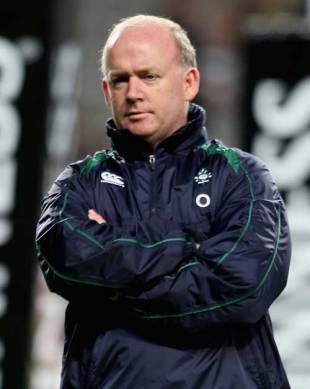|
Comment
Ireland's future in very capable hands
Hugh Farrelly
November 30, 2009

Declan Kidney has given Ireland something to cheer during a troubling month
© Getty Images
Enlarge
November 2009 was recently referred to by the Irish media as the "most depressing month in living memory". The weather, as ever in this country, had a profound effect on the national mood with seemingly incessant rain forcing a host of rivers - led by the Shannon - to burst their banks and leave large tracts of the south and west under water. Ireland's soccer team were palmed out of the World Cup by Thierry Henry's France sparking to a massive outpouring of national anger before the inevitable bout of depression. Throw in the shocking revelations regarding the systematic abuse of children by Catholic priests, the public sector strikes and consistent government-bashing ahead of December's Budget and, all-in-all, it's been a grim few weeks. Enter Declan Kidney… Ireland's ever-modest rugby coach would recoil from the suggestion that he is some sort of messiah or saviour of the national mood but the rugby side's achievements, notably the win over world champions South Africa, were a timely morale-boost. Not that it would ever compare to the effect on the country if the soccer team does well. Rugby has exhibited a remarkable growth in popularity this decade but still languishes far behind Gaelic Games and soccer in terms of participating numbers and overall knowledge. While Kidney could still walk about most towns in Ireland suffering from only intermittent recognition, his football Giovanni Trapattoni excites huge interest wherever he goes in Ireland. However, Kidney would not have it any other way and that's a key component behind Ireland's progress from World Cup flop and Six Nations also-rans to their current status of Grand Slam champions - with an unbeaten record stretching back 11 games to 2008. The Corkman's approach to management is to surround himself with expertise, coaches who work on the specific areas of Ireland's game while he stays in the background as overseer. And Kidney has assembled a backroom team that is, arguably, the equal of any on the international circuit led by South African Gert Smal, the man who masterminded his native country's forward effort which backboned their 2007 World Cup triumph. On Saturday, Smal's insider knowledge proved crucial as the Irish pack tormented the Springbok lineout, for so long a cornerstone of their game, a fact that was ruefully acknowledged by totemic second row Victor Matfield afterwards. "After the first two lineouts, I realised Gert must have taught the Irish guys some Afrikaans," said Matfield. "They were counting with us before the ball was thrown in, he knows our calls so well. It's the worst lineout display I have ever experienced." While the Irish scrum struggled initially against both Australia and South Africa, Smal's influence here was evident also as it rallied strongly on both occasions with fledgling loose-head Cian Healy coming through strongly with further progress expected come the Six Nations.
In the other key area of the breakdown, the Irish back-row came up against two of the game's premier scavengers in Australia's David Pocock and Heinrich Brussow of South Africa but, while both won their share of turnovers, the results did not prove decisive and Smal's back-row, led by flanker David Wallace, was hugely effective on the charge and in the close-in collisions. If Smal has proved to be an inspired signing for Kidney, then so too has defence coach Les Kiss. The Australian was a member of the all-conquering Kangeroos rugby league side that toured Europe unbeaten in 1986 and has enjoyed a successful transition to coaching in the 15-man game - working successfully with the Springboks at the start of the decade and then in Super rugby. The Irish players have bought in enthusiastically to Kiss' defensive system and he has been part of the concerted policy of building relationships with the provinces which can only benefit the national cause. Backs coach Alan Gaffney's status with the provinces is also of considerable benefit. A former head coach of Munster, Gaffney still has a consultancy role with Leinster and, with the international side, he is gradually bringing through a more expansive style which was hard to miss in November. A fourth, less high profile, but highly significant part of the jigsaw is manager Paul McNaughton. Kidney's predecessor Eddie O'Sullivan earned a reputation for his reluctance to delegate and used to handle all matters ranging from disciplinary issues to pre-season preparation himself. McNaughton, who has forged a highly successful career in the business world, is an intelligent, articulate buffer zone and sounding board for Kidney. The two have a very close relationship which adds to the overall sense of purpose and control surrounding the Ireland squad at present. So, while it has undoubtedly been a rough time for the country as a whole - with little prospect of the situation improving significantly any time soon - in rugby terms, Ireland's future appears to be in very capable hands. © Scrum.com
| |||||||||||||||
Live Sports
Communication error please reload the page.
-
Football
-
Cricket
-
Rugby
-
- Days
- Hrs
- Mins
- Secs
F1 - Abu Dhabi GP
Abu Dhabi Grand Prix December 11-131. Max Verstappen ()
2. Valtteri Bottas (Mercedes)
3. Lewis Hamilton (Mercedes)
4. Alexander Albon ()
5. Lando Norris ()
6. Carlos Sainz Jr ()
-
ESPNOtherLive >>
Darts - Premier League
Golf - Houston Open
Snooker - China Open
Tennis - Miami Open

